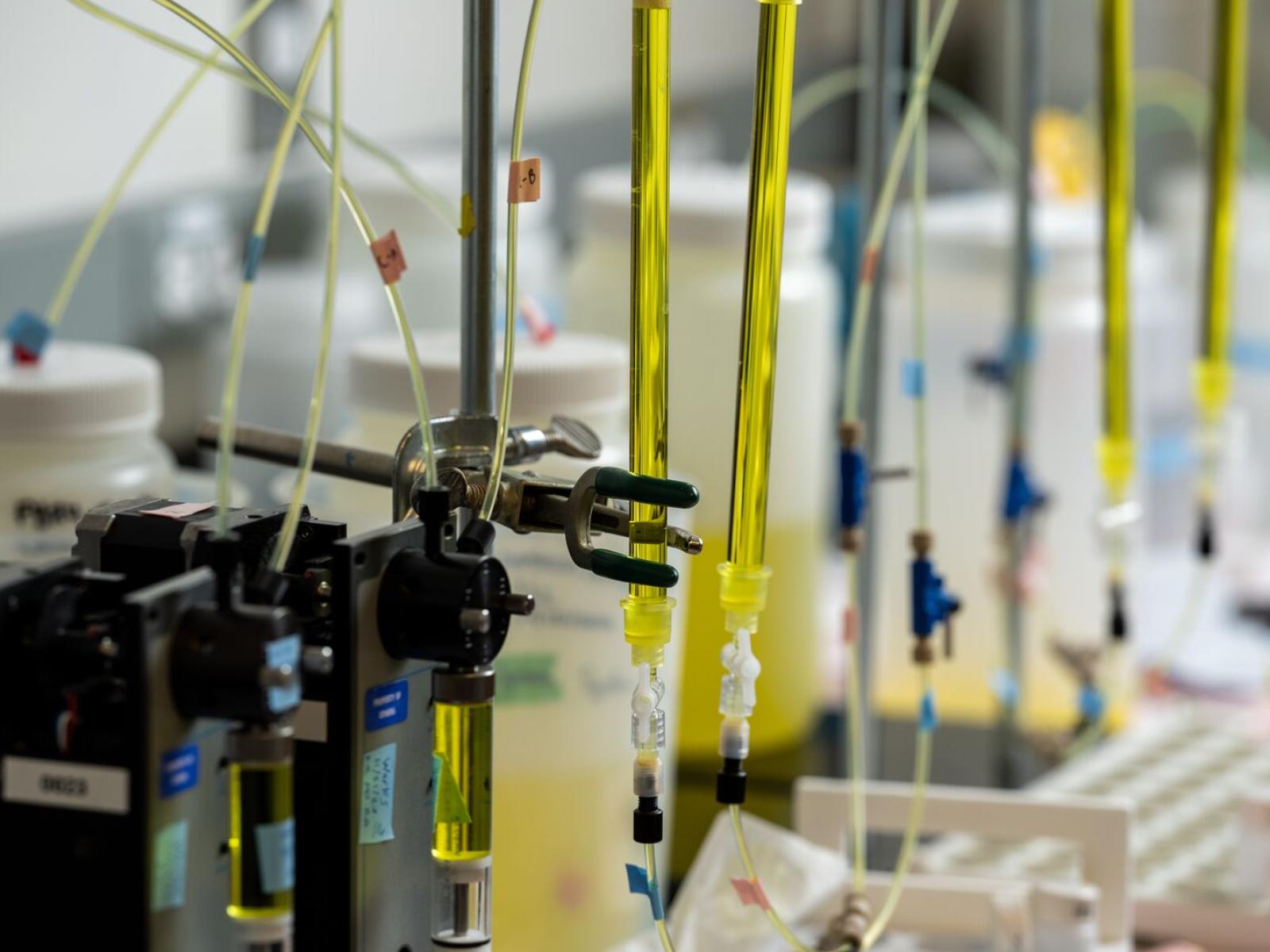331 Analytical Service Center
An in-house capability at PNNL-Richland offering routine and specialized chemical analyses of environmental samples for a broad suite of constituents

Column testing systems like this are used to provide scientific support to the Hanford Site cleanup mission.
(Photo by Andrea Starr | Pacific Northwest National Laboratory)
The 331 Analytical Service Center (331 ASC) at Pacific Northwest National Laboratory (PNNL) is an in-house analytical services capability that offers routine and specialized chemical analyses of environmental samples for a broad suite of constituents.
The 331 ASC—based in the 331 Building/Life Sciences Laboratory—supports applied research in a variety of areas, including contaminant fate and transport in the subsurface, waste form development and testing, and characterization of sediments, wastes, and groundwater. Most of the projects served by the 331 ASC are related to the Hanford Site. Key sponsors include the Department of Energy’s Hanford Field Office and Hanford Site cleanup mission contractors; however, work is also performed for other DOE offices and the Department of Defense.
The 331 ASC is a readily accessible and cost-competitive supplier of project-tailored analytical services, enabling PNNL to solve critically important environmental challenges for the nation.
Analytical Capabilities
Equipped with advanced instrumentation, the 331 ASC is capable of analyzing radiological and non-radiological samples (liquids and solids) for many elements in the periodic table.
Unique analyses include:
- Iodine speciation (iodide, iodate, 127I, 129I) by ion chromatography-inductively coupled mass spectrometry (IC-ICP-MS)
- Chromium speciation (Cr3+, Cr6+) by ICP-MS
- Isotopic ratios for select lanthanides and actinides by ICP-MS
- Rare earth elements by ICP-MS
Standard or enabling analyses include:
- Elemental analysis by inductively coupled plasma optical emission spectrometry (ICP-OES) and ICP-MS
- Inorganic anions by IC
- Total, inorganic, and organic carbon by combustion analysis
- Non-standard analyte lists, special detection limits, and the ability to accommodate small sample sizes are available for many of these techniques.
Supporting capabilities that are conveniently accessible by the ASC include:
- Laser ablation ICP-MS for direct analysis of solid samples
- Elemental composition of solids via X-ray fluorescence (XRF)
- Mineralogical composition of solids using X-ray diffraction (XRD)
- Surface area and porosity measurements using gas adsorption
- Particle size analysis using laser diffraction.
Key Instrumentation
- Dionex ICS 6000 IC system interfaced to a ThermoFisher iCAP RQ-ICP-MS
- Dionex ICS-2000 IC system
- Agilent 7850 ICP-MS
- Dionex ICS-5000 IC system
- Dionex Integrion IC System
- ThermoFisher X Series 2 ICP-MS
- Shimadzu TOC-VCSH carbon analyzer
- 2 Perkin Elmer Optima 8300 DV ICP-OES
- Thermo Scientific Evolution 220 UV-Visible spectrophotometer.
Quality Assurance Program
Analytical work performed by 331 ACS staff is accomplished in accordance with:
- A strict quality assurance (QA) program that is compliant with the Hanford Analytical Services Quality Assurance Requirements Document (HASQARD) and the Department of Defense and Department of Energy Quality Systems Manual for Environmental Laboratories.
- Nuclear Quality Assurance-1 (NQA-1) standard as applied through PNNL policies.
Relationship with the RPL-ASO
The 331 ASC is part of the Radiochemical Processing Laboratory's Analytical Support Operations (RPL-ASO), a service center stewarded by PNNL's Energy and Environment Directorate. While the 331 ASC and the RPL-ASO have some shared capabilities, the two components of the service center are largely complementary. The 331 ASC occupies multiple laboratories in the 331 Building.
The RPL-ASO specializes in:
- Radiochemistry analyses
- The ability to work with highly radioactive samples.
The 331 ASC provides:
- Unique chemical characterization at reduced cost due to the lower overheads associated with non- and low-level radiological samples.
The RPL-ASO service center has fixed unit costs for various sample preparation and analytical methods. These costs include:
- Adders to cover analyst labor
- Consumable supplies (reagents, gases, calibration standards)
- Instrument maintenance
- Instrument service contracts
- Waste disposal and laboratory information management system (LIMS) maintenance
- The QA program and overall administration of these items.
331 ASC Advantages
The 331 ASC has several unique capabilities and attributes that are particularly advantageous to PNNL projects and sponsors. Many of these aspects are not available from commercial analytical laboratories:
- Specialized instrumentation and methodology for iodine and chromium speciation, select lanthanides and actinides isotopic ratio determination, and rare earth elemental analysis
- Non-standard analyte lists and low detection limits
- On-site convenience in Richland, Washington (eliminates the need for contracting and shipping samples off-site)
- Established QA program that meets the strict requirements for Hanford-based projects (both HASQARD and NQA-1)
- Quick turnaround times (typically 2 weeks)
- Ability to work with small sample quantities (e.g., < 10 mL) that are common to bench-scale research projects
- Analysts who are readily available for technical discussions and troubleshooting of results
- Customized sample preparation and batching
- Convenient access to other highly specialized analytical capabilities managed within the same technical group and colocated within the 331 Building.